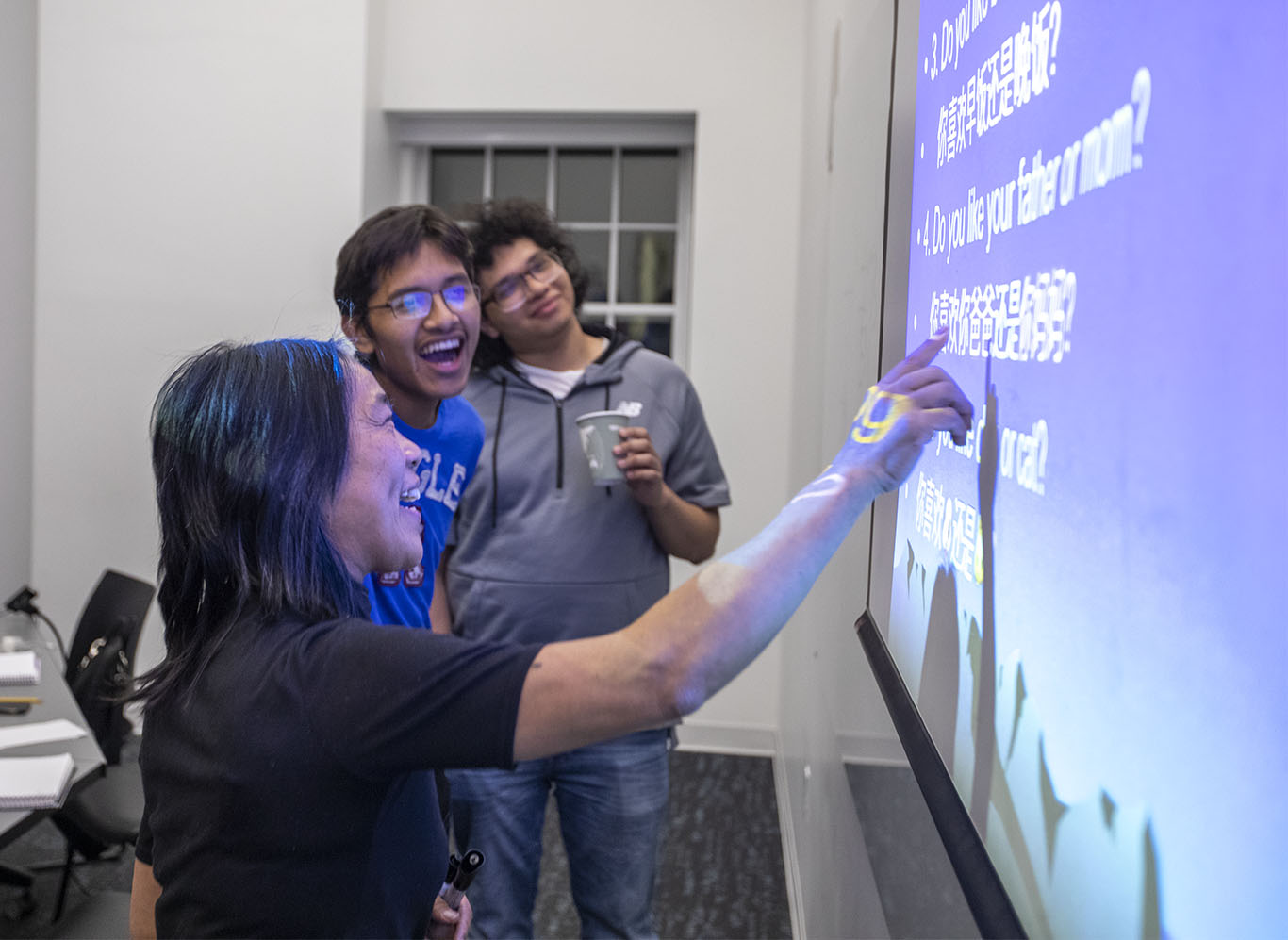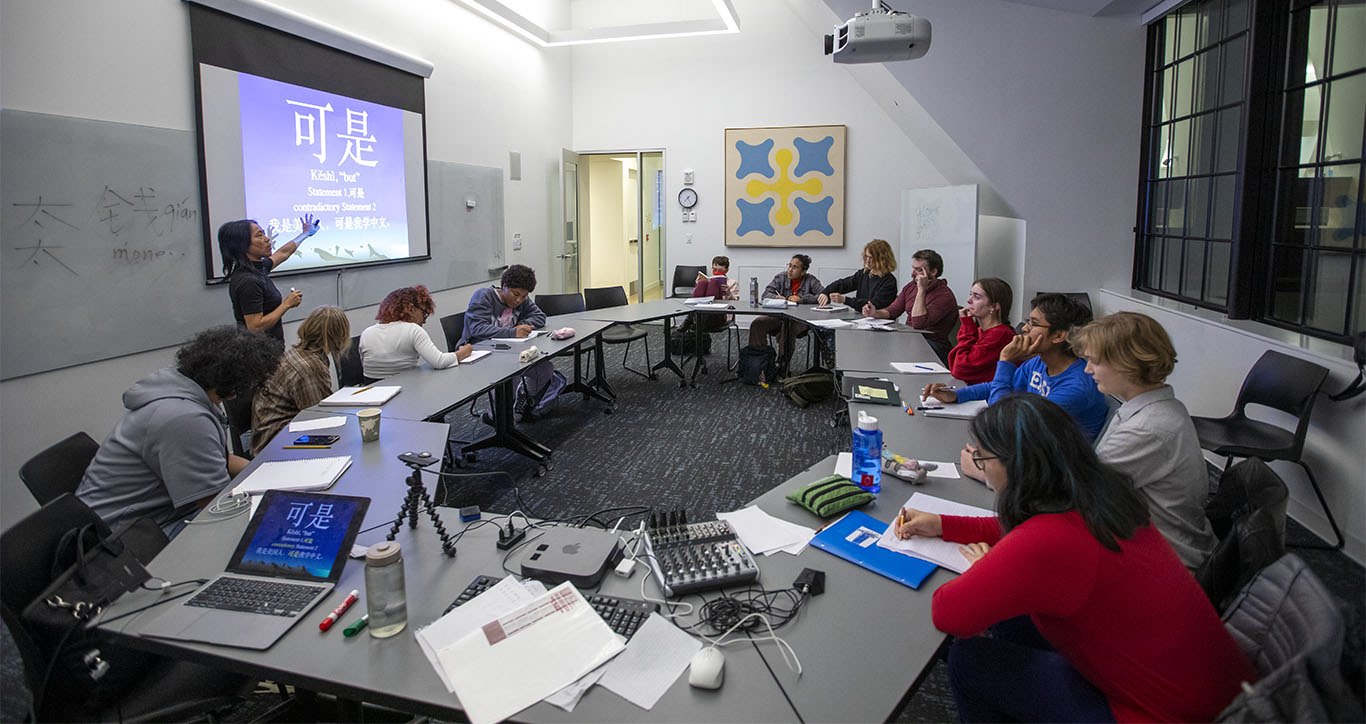An Immersive Approach: Mandarin Chinese Language at Bennington
At Bennington College, as many as half of the courses offered each term are new. Class offerings change with current events and evolve with faculty members’ research interests. While this method is extraordinary regardless of discipline, it is a particularly unusual way to teach Cultural Studies and Languages, compared to methods used at other colleges and universities.
“At Bennington, all language courses—Chinese, French, Japanese, Spanish—are content based,” said Ginger Lin, who has taught Mandarin Chinese Language and Culture at Bennington College for 12 years and created more than twenty courses during that time.
That means faculty members teach language alongside specific relevant cultural topics in ways not seen at other colleges or universities.
“The content-based language teaching at Bennington is very special,” said Lin.
Lin and other language faculty match their students’ abilities, with an understanding of what courses each has taken already, to create exciting new opportunities often based on current events.

Dining Culture in Taiwan
Among Lin’s most popular classes is the introductory course, “Dining Culture in Taiwan.” Arri Dorn ’27 is from Los Angeles and is taking the Dining Culture class as a part of studies in English literature, art history, and creative writing.
“It's a very fun class. We're taking notes, we're learning,” Dorn said. “[Ginger] wants us to communicate with each other, obviously, and practice the language but also, [she encourages us to] pick new people to talk to.”
Dorn continued, “if anyone has any questions or asks how do you say this word randomly, she welcomes those opportunities to teach us anything we want to know. So we're all really engaged with each other and with her. She makes sure we're all having fun together.”
The class also features a field trip to Ala Shanghai Restaurant in nearby Latham, NY, for an authentic dining experience. The trip happens early in the introductory course, so Dorn and her classmates didn’t use much Mandarin, she admitted.
“It was more about the food and bonding together and being more immersed in the culture that we're learning about. And I think it was really effective for that. It was really fun,” said Dorn.
Jade Costello ’24 studies Art History, Asian Studies, French, and Mandarin at Bennington. She has taken courses with Lin every term since sophomore year and remembers the Dining Culture class fondly.
“Ginger makes [language classes] really accessible and approachable,” Costello said. “The way you are introduced to the class is really wonderful. I have been taking [Chinese] ever since as a part of my plan.”
Avant-Garde Art in China
Censorship and human rights abuses in China creates an opportunity to study language through this cultural lens. For instance, Lin teaches “Current Affairs; Taiwan, Hong Kong, and China” and “Avant-Garde Art in China,” which touches on political themes artists, like Ai Weiwei and others, aim to express.
“Andy Warhol and the other artists, they are good, but they are under a free country,” explained Lin. “In China, the artists have to use a very tricky way to show their concept through the art. If it is too clear, they will get arrested. So [there’s] a lot of metaphor and a lot of ‘hint’ behind the artwork or painting.”
The provocative politically oriented classes often attract students who are native speakers. While they don’t need the language instruction, they are interested in the topic, Lin said, “because they didn’t have this information in China.”
Creating materials for new classes is a huge undertaking. She accumulates research over many hours, organizes it, and uses it to create original teaching materials, because, she says, it’s impossible to find class materials to address the topics she wants to teach and those that students want to learn.
“You can’t find this type of material,” said Lin. When a textbook exists, she adds, “ it’s boring and expensive.”
She continues course creation by making presentation slides and worksheets for writing practice, reading comprehension, and other skills. Each time she teaches a class, she updates it significantly.
First World Problems: Microcinema and Popular Media

This term, Lin is teaching “First World Problems: Microcinema and Popular Media.” While she has taught the course before, the course needed to be revisited and updated to account for drastic changes in the media landscape, including TikTok.
Yami Antonio ’26 is taking the Microcinema class as a part of her plan that includes Mandarin psychology, sociolinguistics, and neuroscience classes, which she takes at the University of New Orleans while home for the summer.
During class, she says, “we watch short films and clips about war, transness, identity, and what it means to be gay in China. We talk about sensitive topics, like financial problems and what 'low income' means, what is happening in Taiwan,” she said. “Ginger as a teacher makes the subject so much more engaging.”
Gender and Sexuality in Chinese Culture
Lin is also teaching “Gender and Sexuality in Chinese Culture” this fall. The brand new class is a deep dive into the language of gender and sexuality.
The class begins with the classical sayings. For instance, Lin shared a common saying she and her students have considered in class: “The husband to think. The wife to follow. Be obedient to your father. Be obedient to your husband when you get married. Be obedient to your son when your husband dies.” It reveals the extraordinarily traditional mindset in China.
Even now, Lin says, “There are only a few ways to describe men that are not that good,” Lin said. “But the majority of bad things are always female.”
Costello is grateful for the class, because it relates so specifically to her thesis, which focuses on queer Asian American art.
“I feel like Bennington has an approach where it’s really immersive. You’re not learning random vocabulary that you’ll never use. You are learning about things like you would be learning in any other class but in a different language, so it’s a lot more engaging,” Costello said.
Antonio describes how classes build slowly on the material learned previously. That stepwise growth, the warmth of the community Lin creates, and the emotional and political nature of the subjects Lin teaches through inspires a love of the language and a commitment to continue term after term.
“There’s a patience to the language that I enjoy,” Antonio said.
The course creation and revision continues in the spring of 2024, when Lin will teach “Propaganda in Modern Chinese Culture.”